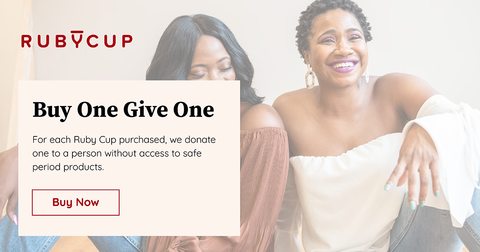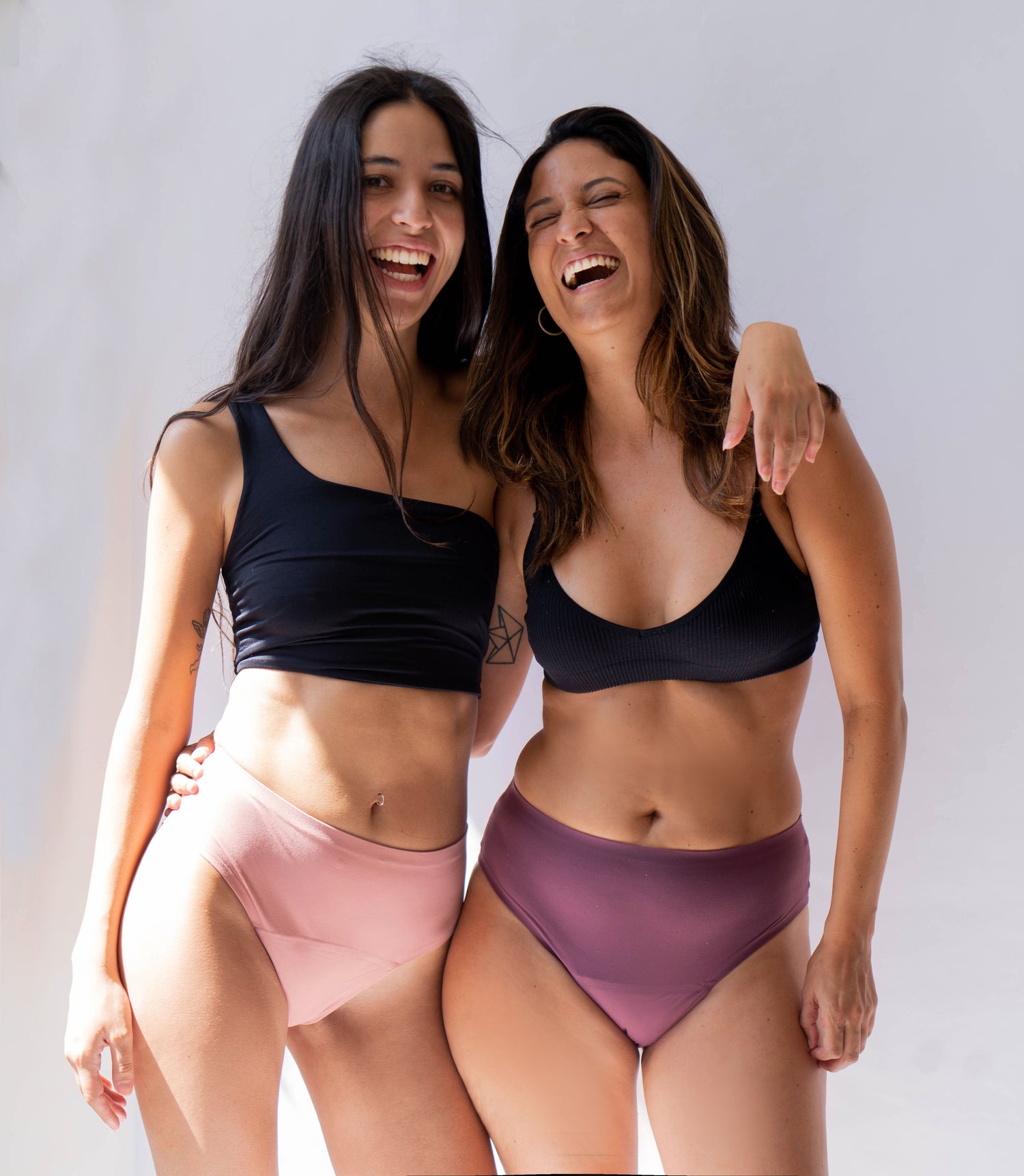You have probably already heard that a menstrual cup is a reusable and sustainable period product, but how long can a menstrual cup last? The very short and equally simple answer is that a period cup can last you up to 10 years. But for the more elaborate version with all the details, read along and get to know what factors help the lifespan of your menstrual cup, and get a proper idea of how much you can save the environment and your wallet in 10 years time.
Making the decision to ditch disposables and making the switch to a period cup can be done in the blink of an eye - but the impact of that decision can literally expand over up to a decade. On your daily life, on your environmental footprint, and on your wallet. That’s quite impactful, right? But what’s more is that with no extra effort you can literally impact someone else’s life just as much as your own for the same amount of time. That’s because every purchase of a Ruby Cup includes a donation of another Ruby Cup to someone without safe access to period products.
The most long-lasting period product existing
Long-lasting. That’s a word you like to hear in relation to good habits, fun times, and any product you buy, if zero-waste, minimalism and money-saving are priorities to you.
The good news is that a menstrual cup is exactly that: Long-lasting, and very much so. With a lifespan of up to 10 years, it will become your partner in crime for up to 120 menstrual cycles. That’s quite a contrast to disposable period products such as traditional pads and tampons that are literally single-use, that you need a bunch of (averagely 22.5) just to cover one menstruation.
A Ruby Cup period cup lasts up to 10 years. “Up to” because the 10 years expected lifespan depends on how the cup is taken care of during and in between periods - it is important that it is sterilized properly every month and handled and stored suitably gently throughout the years - this part is in the hands of the users.
Make sure you go for a menstrual cup made out of 100% medical grade silicone, as this is the material choice that allows the long life-span of your cup. Medical grade silicone is a highly chemically stable form of silicone, which is extremely lasting, non-toxic and hypoallergenic to the human body. In other words, the ideal material for a period cup, and (of course!) the material Ruby Cup is made of.
Giving your period cup good lifespan projections - here’s what’s in your hands
Not all menstrual cups are created equal. There are different materials and different qualities out there, so read up on what you are buying. As the skin inside of your vagina is as delicate as the gums in your mouth, you only want to put the best and most healthy material in there. For reasons you read about above, medical grade silicone is the material you should go for.
On top of finding a top quality menstrual cup of medical grade silicone, you also need to make sure to take consistent good care of your cup over the years in order to help it make it to its 10th birthday!
- Properly sterilize it between periods: To help your cup last as long as possible and to avoid infections, be sure to only boil it for 2-3 minutes. It’s possible that repeatedly boiling it for more than 3 minutes may reduce the lifespan of the cup (and after 2-3 minutes it is already sterilized, it won’t get cleaner by boiling longer).
- Avoid any chemical products you would use to clean your house such as alcohol, bleach or dishwashing liquid
- Handle it with newly washed hands when inserting and removing it.
- Empty and rinse it every 8 hours when you are on your period.
- Store it in a non-airtight environment such as in the breathable cotton bag you got when you bought the cup - and make it a habit to also wash the cotton bag every now and then (e.g. every 4 months).
- Avoid oil-based lubricants and any harsh or oil-based soap and lotion.
- Don’t use your cup together with vaginally injected medicine.
- Go easy on your cup (give it a break altogether) if you get a vaginal yeast infection or bump into bacterial vaginosis.
- Keep away from scratchy surfaces (and cats!).
Then you should be sure to have your period cup in shape for many years! It’s very simple and doable, just make sure to create good habits around it - for you and your cup.

Can all period cups last up to 10 years?
We and various other trusted menstrual cup brands all consider the lifespan of a menstrual cup up to 10 years, and this is also the timeframe used as a reference point in various large studies, such as this study conducted in 2021 by Life Cycle Initiative and the UN Environment Programme.
But some brands are more vague about their product’s lifespan, such as Diva Cup that suggests a lifespan of their menstrual cup of ”several years”. Sckoon says their product will last “over 5 years”, Hello Cup for 5 years, FemmyCycle’s period cup is “reusable for up to two years”, Aisle Cup says that once per year is their rule of thumb, and Lunette suggests replacing their product “every 1-2 years”.
At Ruby Cup we believe in caring for your period cup as best as possible in order to keep it for as long as possible. The longer its lifespan, the more zero waste your period, the more coins in your piggy bank, and the better overall common sense, we think.
We offer a 120-day full exchange or refund on Ruby Cups, no questions asked, as we want to make sure that you have time (3-4 menstruations) to get used to our period cup and find out if it is your long-term solution. This means that you can try your cup and exchange it for another size or ask for your money back within 120 days, and we’ll happily help you out.
Here’s how much you can save the environment in 10 years
In 10 years time - a full decade - a switch from disposables to a menstrual cup will save the environment a whole lot of plastic waste! You might find it interesting taking a look at our Ruby Cup impact calculator that will help you estimate how many disposable products your switch can prevent from ending up in landfills based on your age.
People who menstruate do so for an average of 451 menstrual cycles. For people who solely use disposables throughout all their cycles, whether menstrual pads or tampons, this amounts to an average of 11,000 disposable products used in a lifetime of which any number of products end up in landfills. 11,000 single-use products contain as much plastic as 5,500 plastic carrier bags.
A recent report produced in a collaboration between the UN Environment Programme and Life Cycle Initiatives concludes that “even if used for just one cycle (one month), the menstrual cup has lower impacts than the single-use products (assuming 20 pads or tampons are used in a month)”. The menstrual cup was found to have less than 1.5% of the impact of disposable pads and tampons across categories such as resource depletion, ecotoxicity, climate change, and more. The water used for cleaning your cup during and between menstrual cycles have been accounted for in these calculations!

Any purchase of a Ruby Cup includes a donation to someone without safe access to menstrual products. So not only are you lowering your own period-related environmental footprint by making the switch - you are also lowering the period-related environmental footprint of someone else. Get your Ruby Cup now.
Here’s how fat you can get your piggy bank in 10 years
If used for its maximum potential lifespan, your Ruby Cup will be with you for 120 menstrual cycles. With its price of €28.95 if purchased in Europe (insert price in your local currency if purchased from anywhere else in the world), this means €0.24 per menstrual cycle, provided that you use nothing but your Ruby Cup to handle your period.
The average cost of disposable period products is €3.15 per menstrual cycle. This number varies depending on where in the world you live. Sticking to the average number, you’ll be ready to put cents or pennies in your piggy bank after 9.2 menstrual cycles when switching from disposable tampons or pads to a menstrual cup.
You will in other words be saving money in less than a year. Every month after 9.2 cycles, you can feed your piggy bank €3.15 making it €37.8 heavier and richer yearly. If you and your menstrual cup make it through a full decade together, you will have saved €349 in total.
Your de facto total savings could even be bigger than what €349 is worth in 2022, as in ten years the prices of disposable menstrual products may increase.
And because a purchase of a Ruby Cup includes a donation to someone without safe access to menstrual products, you can help someone else (who really needs it!) work on their piggy bank too over the next up to 10 years. Get your Ruby Cup today.

In conclusion: The decision to ditch disposables and switch to a menstrual cup can be done in the blink of an eye, but the impact of your decision will remain for up to 10 years for yourself and someone else!
 Your Account
Einloggen
Your Account
Einloggen
 Basket
Basket



